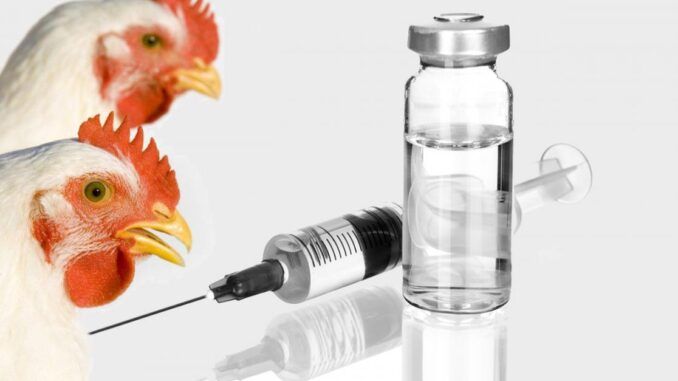
Health officials in the US are getting ready to test a vaccine for poultry to combat what they claim is the worst bird flu crisis on record.
This move is in response to rising fears about the spread of highly virulent avian influenza, which has resulted in the deaths of millions of birds. There are also increased fears about human spillover.
The World Health Organization (WHO) has also issued a warning after cases of the virus strain jumping from birds to mammals were reported, urging countries to prepare for the possibility of another pandemic caused by H5N1….. ‘Human bird flu’.

BYPASS THE CENSORS
Sign up to get unfiltered news delivered straight to your inbox.
You can unsubscribe any time. By subscribing you agree to our Terms of Use
The USDA did not disclose any information on the kind of vaccines that would be used during the testing process
The Mail Online reports: The Department of Agriculture is involved in developing an updated shot and hopes to start trialing it soon, though it has not offered a timeline. The actual testing process, one it begins, would take at least three months.
While animal vaccines can take years to be licensed parts of the process can be accelerated in emergency cases.
Concerns about the avian flu strain currently circulating have risen in recent weeks after it became evident that it spread from birds to several mammals, including otters and foxes.
The World Health Organization warned this week that the world must prepare for a potential human bird flu pandemic, saying the jump from birds to mammals put us one step closer to human transmission.
Erin Spackman, a virologist who studies avian influenza vaccines at the USDA told CBS: ‘There are a lot of moving parts to this kind of testing. And some of it is just pure logistics of getting everything in place to do the testing, getting the vaccines that are updated, getting things from parties that are involved, different manufacturers.’
While it is not always a requirement for animal shots to be licensed by the USDA, the trials will offer an early independent evaluation of how well a vaccine works in this case.
USDA spokesperson Mike Stepien told CBS News: ‘The decision to proceed with vaccination is complex, and many factors must be considered before implementing a vaccination strategy.’
The USDA did not disclose details about the shots it would use in testing, though there are a few in development.
And at the Pirbright Institute in the UK, scientists are developing an improved shot that involves tagging flu virus proteins with a marker that makes them easier for antigen-presenting cells (APCs) to capture. This generates faster and stronger immune responses to the bird flu strain compared to the inactivated virus vaccine that is the current standard.
Scientists at the University of Wisconsin’s School of Veterinary Medicine for example are working on an avian flu vaccine that uses tiny particles even smaller than the width of a human hair to deliver immunity by sending pathogen-like signals to cells.
If an updated shot proves effective, that would open the door to USDA approval followed by a thorough vaccination campaign that seeks to reach the affected commercial poultry industry.
While shots for the purpose of fending off avian flu have been used in the past, the USDA has not approved one for what is considered ‘highly pathogenic’ avian influenza.
The avian flu of the ‘low pathogenicity’ category is not uncommon in wild birds and typically causes few or no signs of infection.
But a ‘highly pathogenic’ strain is highly contagious and deadly to domestic poultry.
The USDA says in the event that the latter sweeps domestic poultry farms, farmers must quickly eradicate the disease by culling the flocks.


